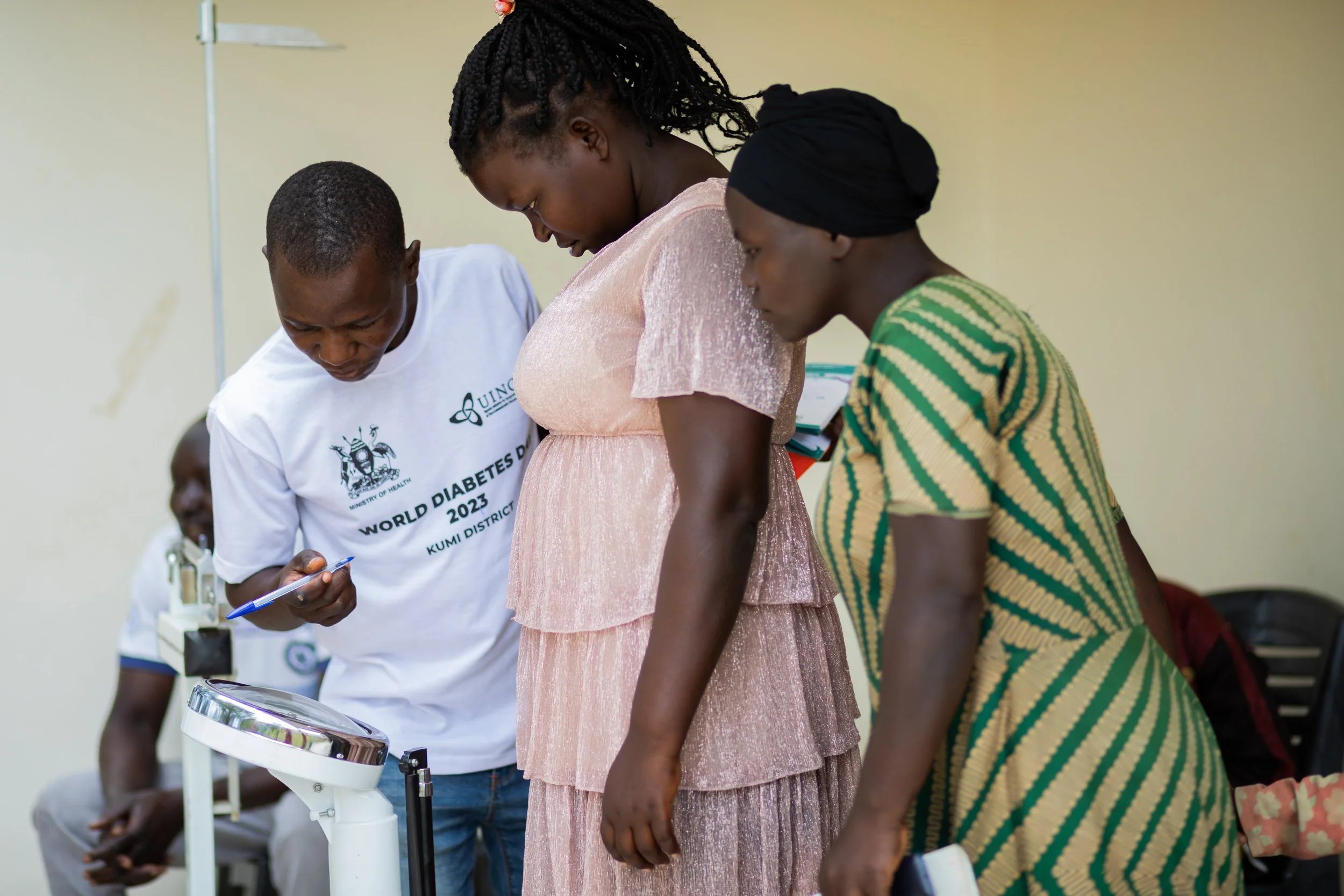Network Advocates for Expansion of WHO’s Essential Medicines List
The Network has requested the addition of analogue insulins and a triple fixed-dose antihypertensive medicine combination to the list, as well as the reclassification of haemoglobinopathies.
Ochom Samuel Joel, a nursing graduate and volunteer, assists a patient at the PEN-Plus clinic at Atutur General Hospital in Uganda. The clinic dedicates every Wednesday to patients living with type 1 diabetes. Volunteers like Ochom play a vital role in receiving new patients, ascertaining their needs, taking their vitals, and running simple tests. (©Badru Katumba/World Health Organization)
Analogue insulins—synthetic versions of human insulin that are modified to change how quickly and how long they act in the body—have long been the standard of care for people living with type 1 diabetes in high-income countries. Designed to mimic the body's natural insulin release patterns more closely than traditional human insulins, analogue insulins lead to faster absorption and longer durations of effect.
In many low- and middle-income nations, though, human insulin remains the standard, largely because of high price and low availability.
This spring, the NCDI Poverty Network submitted a proposal to the World Health Organization for inclusion of analogue insulins in the WHO Model List of Essential Medicines (EML), which is updated every two years. The last update was published in July 2023.
Dr. Gene Bukhman, co-chair of the NCDI Poverty Network and executive director of the Center for Integration Science in Global Health Equity at Brigham and Women’s Hospital, submitted the proposed addition on behalf of the Network. The Center for Integration Science serves as the U.S. co-secretariat of the Network.
“As a network dedicated to addressing severe chronic diseases in the world’s poorest populations, we witness firsthand the urgency to expand access to insulin for people living with diabetes,” Dr. Bukhman wrote. “We welcome recent evidence demonstrating the clinical importance of analogue insulins in low-resource settings and look forward to further evidence in the coming months.”
At the same time, Dr. Bukhman submitted two other proposals to WHO: the addition of a triple fixed-dose antihypertensive medicine combination to the EML and a reclassification of haemoglobinopathies.
The triple combination antihypertensive pill, which includes low-dose formulations of three first-line antihypertensive agents, has been demonstrated to control blood pressure more effectively than mono- or dual- therapy, enhance adherence by reducing pill burden, and reduce the risk of cardiovascular events, particularly among high-risk patients.
“The addition of a triple fixed-dose triple antihypertensive medicine combination to the EML has the potential to transform care for people with severe and advanced hypertension in low- and low-middle income countries, making treatment simpler and more widely accessible,” wrote Dr. Bukhman. “To ensure full impact, though, this decision must be paired with budgetary commitments, improved affordability, strengthened procurement and supply, and health system integration.”
The Network’s proposed reclassification of haemoglobinopathies stems from the disproportionate burden that sickle cell disease and thalassemias place on people living in low- and middle-income countries, where access to treatment is often limited. Dr. Bukhman believes the proposed reclassification would be an important step toward ensuring that these life-threatening, yet treatable conditions receive the attention and priority they need from global health institutions, national policymakers, and health program implementers.
“By reclassifying haemoglobinopathies for greater prominence and clarity, WHO can highlight the need for a renewed global commitment to addressing these conditions,” wrote Dr. Bukhman. “We look forward to collaborating with WHO and other allies to better ensure access to diagnosis and treatment for these severe NCDs among the world’s poorest billion.”

